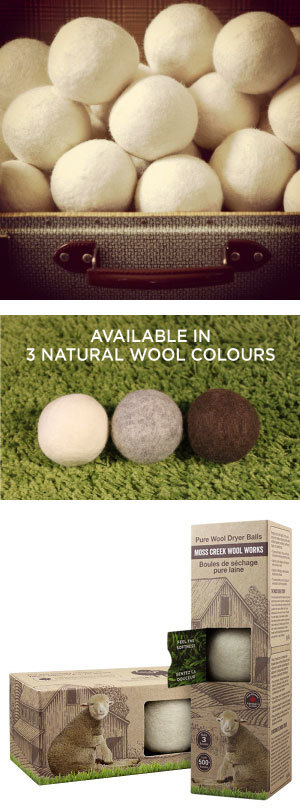All Natural Wool Dryer Balls
Please note that all of information provided on our website about our products is meant to be informative only. For more information regarding prices and shipping (within Canada only) please visit our store in Barrie (515 Bryne Drive, Barrie, ON), phone us (705) 726-7600 or send us an email [email protected].
 Our all natural wool dryer balls are made by an environmentally conscious Canadian
Our all natural wool dryer balls are made by an environmentally conscious Canadian ![]() company that is committed to quality, hand-crafted Canadian design. Created in Hamilton, Ontario, their Dryer balls save time and money! By reducing drying time, they save on electricity and preserve the lifespan of your clothing. No chemicals, perfumes or dyes are used to make them. Each ball is hand crafted using only Merino, Polworth or Corriedale wool - depending on the colour. They are tested to last for 500+ loads.
company that is committed to quality, hand-crafted Canadian design. Created in Hamilton, Ontario, their Dryer balls save time and money! By reducing drying time, they save on electricity and preserve the lifespan of your clothing. No chemicals, perfumes or dyes are used to make them. Each ball is hand crafted using only Merino, Polworth or Corriedale wool - depending on the colour. They are tested to last for 500+ loads.
Wool Dryer Balls are any safe alternative to chemical dryer sheets that work by coating the fabric fibres with toxic chemicals that build up over time. They work to reduce static cling by absorbing moisture from clothing in the dryer, maintaining a more humid environment and, therefore, cutting down on static build up.
Available in natural colours (no dye) brown, grey or white. The colour does not affect the performance in any way and will not transfer to the clothes as it is the natural sheep's natural colour.
There are three balls in a package, and are available in all white, all brown, and all grey, or mix and match your own set of three colours!
Dryer Ball Tips:
- While using 3 dryer balls is great, 6 balls dry large loads even faster.
- To avoid lost balls, keep them in your dryer between loads.
- To prevent static cling, avoid over drying and remove synthetics early.
- To scent clothes, add 2-3 drops of essential oil to the wool balls.
Other uses for Wool Balls:
- Wool balls make great pet toys, your dog or cat will thank you.
- Ideal for fluffing up down jackets, duvets and pillows
- Wool is biodegradable. Plant them in the garden where they decompose, releasing valuable nutrients.

